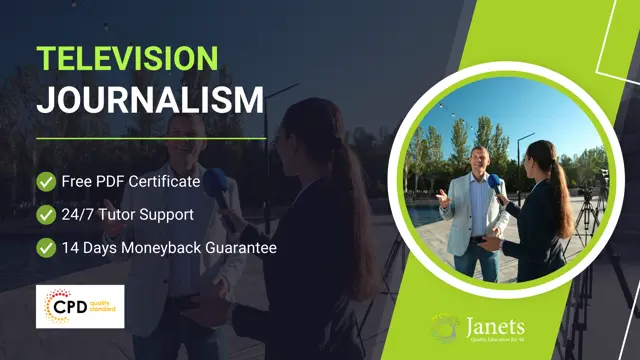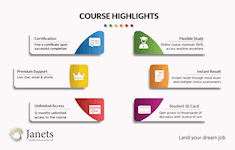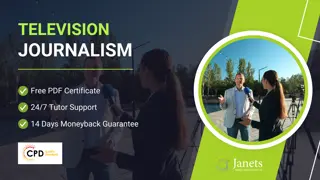
Television Journalism
CPD Certified | FREE PDF Certificate | Online Video Course | Assessment Included | 24x7 Tutor Support | 1 Year Access
Janets
Summary
- CPD Accredited PDF Certificate - Free
- CPD Accredited Hard Copy Certificate - £15.99
- Exam(s) / assessment(s) is included in price
- Tutor is available to students
Add to basket or enquire
Overview
Uncover the world of television journalism with our comprehensive Television Journalism course. Learn the ins and outs of news gathering, storytelling, and the technical aspects of the field. This Television Journalism course is for anyone looking to break into the world of TV journalism. Join us and learn how to bring the world to life in a way that captivates and informs audiences.
Our Television Journalism course is a comprehensive programme that covers all aspects of the field, from news gathering to technical aspects of television production. The Television Journalism course will take you through the process of finding and developing enterprising stories, understanding how to work with sources and cover events, as well as the legal and ethical responsibilities that come with being a television journalist.
The Television Journalism course is designed to provide hands-on learning experience, giving students the opportunity to develop the skills they need to succeed in the industry. With modules covering topics such as computer-assisted reporting, operating standards for news and public affairs, and lighting, this course is perfect for anyone looking to break into the world of TV journalism or for current journalists looking to improve their skills.
Learning Outcomes
Upon completion of this course, you will be able to:
- Gather news in a variety of ways, including computer-assisted reporting.
- Develop and produce enterprising stories.
- Understand how to work with sources.
- Learn how to cover events effectively.
- Understand the technical aspects of television journalism, such as lighting.
- Describe the legal and ethical responsibilities of a television journalist.
- Gain an understanding of the various roles of a broadcast news team.
- Identify the industry's operating standards for news and public affairs.
What You Get Out Of Studying With Janets
- Free PDF certificate upon successful completion of the course
- Full one-year access to course materials
- Instant assessment results
- Full tutor support available from Monday to Friday
- Study the course at your own pace
- Accessible, informative modules taught by expert instructors
- Get 24/7 help or advice from our email and live chat teams with the training
- Study at your own time through your computer, tablet or mobile device
- Improve your chance of gaining valuable skills by completing the course
Enrol in the Television Journalism course to find out more about the topic and get one step closer to reaching your desired success!!
Certificates
CPD Accredited PDF Certificate
Digital certificate - Included
CPD Accredited Hard Copy Certificate
Hard copy certificate - £15.99
A physical, high-quality copy of your certificate will be printed and mailed to you for only £15.99.
For students within the United Kingdom, there will be no additional charge for postage and packaging. For students outside the United Kingdom, there will be an additional £10 fee for international shipping.
CPD
Course media
Description
The Television Journalism course is delivered through Janets’ online learning platform. The Television Journalism course has no formal teaching deadlines, meaning you are free to complete the course at your own pace.
Each session in this Television Journalism course is thorough and easy to understand. The extensive course materials of the Television Journalism course is accessible at any time and from any location, allowing you to study at your own speed in the comfort of your own home. Throughout the course, you will receive tutor support, and our helpful customer service is available around the clock to help you with any problems you might face while studying the Television Journalism course.
Course Modules
This Television Journalism course contains the following modules:
- Module 1: News Gathering
- Module 2: Enterprising Stories
- Module 3: Watch your interviewee’s body language.
- Module 4: Working with Sources
- Module 5: Covering Events
- Module 6: Computer-Assisted Reporting
- Module 7: Glossary of Broadcast News Teams
- Module 8: Law, Ethics And Responsibility
- Module 9: Operating Standards for News and Public Affairs
- Module 10: Lighting
Method of Assessment
To successfully complete the course, students will have to take an automated multiple-choice exam. This exam will be online and you will need to score 60% or above to pass the course.
After successfully passing the course exam, you will be able to apply for a certificate as proof of your expertise.
Who is this course for?
This Television Journalism course is ideal for:
- Aspiring television journalists.
- Current journalists looking to improve their skills.
- Anyone interested in breaking into the world of TV journalism.
- Students studying communications, journalism, or a related field.
Requirements
No prior qualifications are needed for Learners to enrol on this Television Journalism course.
Career path
Upon completing this Television Journalism course, you may pursue the following career paths:
- Television Journalist (£20,000 - £30,000 per year)
- News Producer (£25,000 - £35,000 per year)
- News Anchor (£25,000 - £35,000 per year)
- Camera Operator (£20,000 - £30,000 per year)
- Sound Engineer (£20,000 - £30,000 per year)
- News Director (£35,000 - £45,000 per year)
Questions and answers
Currently there are no Q&As for this course. Be the first to ask a question.
Reviews
Currently there are no reviews for this course. Be the first to leave a review.
Legal information
This course is advertised on reed.co.uk by the Course Provider, whose terms and conditions apply. Purchases are made directly from the Course Provider, and as such, content and materials are supplied by the Course Provider directly. Reed is acting as agent and not reseller in relation to this course. Reed's only responsibility is to facilitate your payment for the course. It is your responsibility to review and agree to the Course Provider's terms and conditions and satisfy yourself as to the suitability of the course you intend to purchase. Reed will not have any responsibility for the content of the course and/or associated materials.





